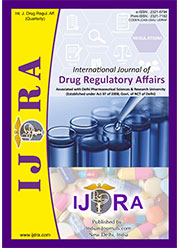TRIPS AND INDIAN PHARMACEUTICAL INDUSTRY
Abstract
The TRIPs Agreement has led to a reinforcement of the protection of intellectual property, particularly in many developing countries. From the point of view of transfer of technology, the imitation of technologies from industrialized countries and the marketing of the resulting products will now be more difficult. The MNCs are also expanding vigorously in the generic segments. They are trying to grow not only organically, but through mergers and acquisitions and strategic alliance with Indian generic companies.
90% of the Indian Pharmaceutical Industry was dominated by the Global companies that imported most of the drugs. During the early 1970s, the Indian players gradually gained prominence as a result of the Indian Patent Act, 1970 which allowed Indian companies to reverse engineer Patented Molecules and launched them in the domestic markets.
Downloads
References
Working Paper series [Internet]. 2011;[cited 2013 Nov 03].
Available from: http://facultylive.iimcal.ac.in/sites/facultylive.iimcal.ac.in/files/WPS%20685_0.pdf.
2. Chaudhuri S, Chan P, Gopakumar KM. Five Years into the Product Patent Regime: India’s Response. New York: United Nations Development Programme, 2010.
3. Chaudhuri S. TRIPS Agreement and Amendment of Patents Act in India [Internet]. [updated 2002 Aug 16; cited 2013 Sept 27]; http://www.scribd.com/doc/68993504/TRIPS-AND-AMENDMENT-IN-INDIAN-PATENT-ACT.
4. Pharmaceuticals. Connaught International Consulting. [Internet]. [updated 2013; cited 2013 Sept 29]; Available from: http://connaughtinternational.com/industry.php
5. Medicines. WTO and the Trips agreement. WHO [Internet]. [updated 2013; cited 2013 Sept 21]; Available from: http://www.who.int/medicines/areas/policy/wto_trips/en/
6. Access to Medicines. Medecins Sans Frontieres [Internet]. [updated 2013; cited 2013 Oct 4]; Available from: http://www.doctorswithoutborders.org/news/allcontent.cfm?id=84
7. Chaudhuri S. TRIPS and Changes in Pharmaceutical Patent Regime in India [Internet]. [updated 2005 Jan; cited 2013 Oct 23]; http://www.who.int/hiv/amds/IDA_India-Patent-amendments-Sudip.pdf.
8. Chaudhuri S. Compulsory Licensing under India’s Amended Patent Act Technology Policy Briefs. Maastricht: United Nations University Institute for New Technologies. 2002 (a); 1(3).
9. Love J. Compulsory Licensing: Models for State Practice in Developing Countries, Access to Medicine and Compliance with the WTO TRIPS Accord. Jan 21,2001.
The International Journal of Drug Regulatory affairs require a formal written transfer of copyright from the author(s) for each article published. We therefore ask you to complete and return this form, retaining a copy for your records. Your cooperation is essential and appreciated. Any delay will result in a delay in publication.
I/we have read and agree with the terms and conditions stated Page 2 of this agreement and I/we hereby confirm the transfer of all copyrights in and relating to the above-named manuscript, in all forms and media, now or hereafter known, to the International Journal of Drug Regulatory affairs, effective from the date stated below. I/we acknowledge that the IJDRA is relying on this agreement in publishing the above-named manuscript. However, this agreement will be null and void if the manuscript is not published in the IJDRA.
Download link for COPYRIGHT FORM







